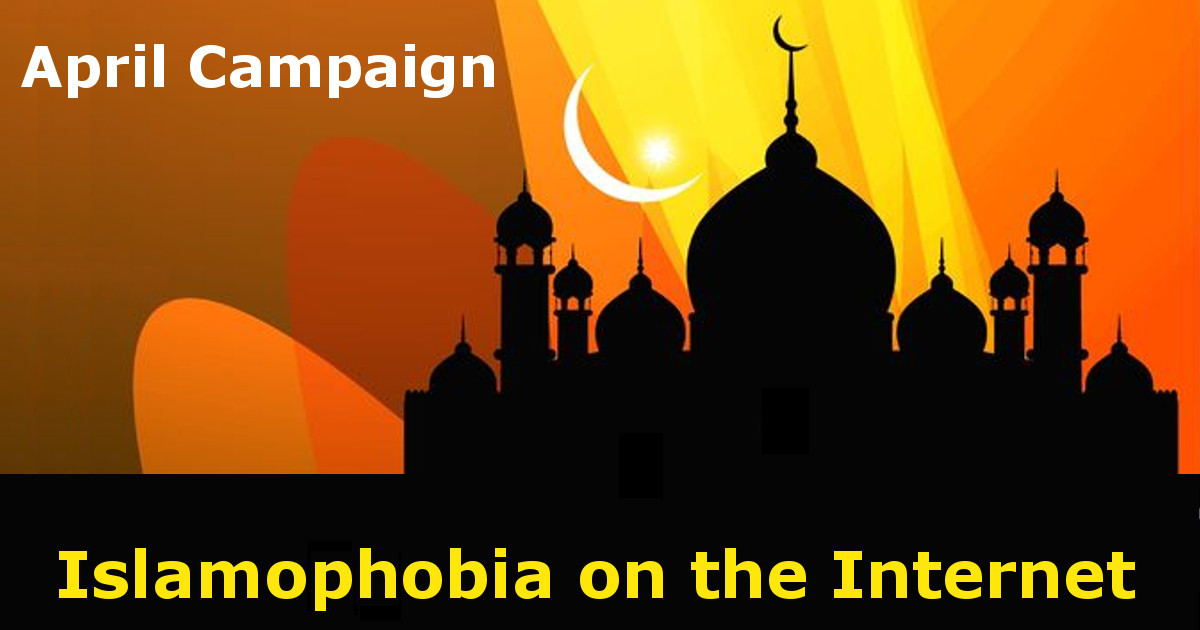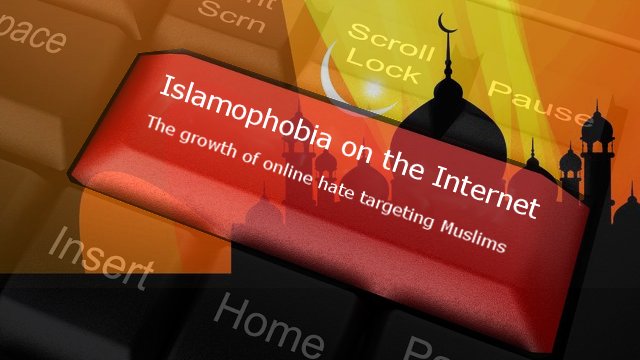This page provides details on Islamophobia and the work of the Online Hate Prevention Institute to tackle it.
Index
Definition of Islamophobia (Anti-Muslim Hate)
We support the use of the All Party Parliamentary Group on British Muslims definition of Islamophobia (November 2018):
“Islamophobia is rooted in racism and is a type of racism that targets expressions of Muslimness or perceived Muslimness.”
We add that Islamophobia is an attack on the human rights and human dignity of Muslim people, people perceived to be Muslim, or those supporting Muslim people who are attacks due to that support. See more.
Support our work tackling Islamophobia
All donations of $2 or more are processed as donations to the Online Hate Prevention Fund and are tax deductible for Australian tax payers.
- During April 2020 you can support our month long campaign on Islamophobia.
- You can support our work on Islamophobia throughout the year by donating here.
- Donations to support our work across all forms of online hate are particularly appreciated.
Legal Details: The Online Hate Prevention Institute (ABN: 65 155 287 657) is a Registered Charity. We accept donations to the Online Hate Prevention Fund which is a public fund listed on the Register of Harm Prevention Charities under Subdivision 30-EA of the Income Tax Assessment Act 1997. Donations of $2 or more made to the fund may be claimed as a Tax Deduction in Australia.
Articles
All
Briefings
Reports
OHPI produces detailed reports documenting and analysing online hate. The reports are produced over a number of months addressing a theme in a systematic and in-depth manner. These reports are published by OHPI and made freely available to the public.
January 17, 2020: Andre Oboler, Mark Civitella, Nasya Bahfen, “Submission on Anti-Vilification Protections”
This report is a submission to a Victorian Parliamentary Inquiry into vilification laws. We highlight the need for such laws with respect to Islamophobia.
December 10, 2015: Spotlight on Anti-Muslim Internet Hate Interim Report
This interim report provides some background and data from OHPI’s “Spotlight on Anti-Muslim Internet Hate” Campaign. This report is based on over 1,100 items of anti-Muslim hate in social media reported and categorised by the public through our FightAgainstHate.com reporting tool. The vast majority of the hate this report is based on was found on Facebook. The report indicates the volume of content by category, and how effective Facebook has been in responding to content in each category.
January 19, 2015: Je Suis Humain: Responsible free speech in the shadow of the Charlie Hebdo murders
This report explores the response of mainstream and social media to the terror attacks in France in January 2015, particularly with respect to free speech. It examines where to draw the line between free speech and attacking a person’s dignity in the light of the Charlie Hebdo attacks. Some key points from the report:
- The discussion on where the line rests between free speech and right to human dignity has to take into account the fact that Australia celebrates multiculturalism and religious diversity. The French tradition of Laïcité, in contrast, takes a much more intolerant view of religion in the public sphere.
- There is a difference between criticism of a religion and attacking the people who practice it. Critiquing religion, which is a set of ideas, is not hate speech. Stereotypying and dehumanising a group of people, identified by their religion, is hate speech. The report illustrates the difference using images taken from a Facebook page, which was not specifically dedicated to hate.
- The report looks at how media around the world have responded to the events, and recommended against them republishing the cartoons lampooning the Prophet by Charlie Hebdo.
- It recommends social media users show solidarity with the victims using the universal hashtag “JeSuisHumain” rather than the more divisive “JeSuisCharlie” or “JeSuisAhmed”.
- The report makes a case for Section 18C of the Racial Discrimination Act being expanded to bring religious vilification within its purview.
- It calls for greater vigilance against rising antisemitism, which in turn is fueling radicalisation of parts of the Muslim community in Europe.
December 10, 2013: Islamophobia on the Internet: The growth of online hate targeting Muslims
This work examines 50 anti-Muslim Facebook pages from which it documents 349 images of anti-Muslim hate. These images represent 191 unique images and many repetitions as messages of hate move between the different pages. The message of hate in this report are divided into seven themes which the report discusses:
- Muslims as a Security Threat or Threat to Public Safety
- Muslims as a Cultural Threat
- Muslims as an Economic Threat
- Content Dehumanising or Demonizing Muslims
- Threats of Violence, Genocide and Direct Hate Targeting Muslims
- Hate Targeting Refugees / Asylum Seekers
- Other Forms of Hate Speech
December 8, 2014: How Facebook Responded to Anti-Muslim Hate
This report gives an update tracking the removal (or growth) of pages discussed in the 2013 report.
Media
Campaigns
April 2020 Campaign – Combating Online Islamophobia

Our April 2020 campaign was a month long campaign that aimed to increase the focus on preventing online Islamophobia.
2015 Spotlight on Anti-Muslim Internet Hate

This four month campaign collected over 1,000 items of Islamophobic content using OHPI’s Fight Against Hate reporting tools then analysed them with the support of international experts.
2013 Islamophobia on the Internet Campaign

This major project over most of 2013 manually examined 50 anti-Muslim Facebook pages and documented 349 images of anti-Muslim hate. The results were presented in a report (available below). They were also presented in the United Nations in New York and the methodology used has been presented in universities around the world.
Report Islamophobia
You can report without an account (just paste the web address of the content below and press the blue arrow to submit), but you won’t be able to classify items, or track your history of reporting, unless you login first. To login click “Login / Register” which will allow you to create or access your account using your Facebook or Google account.
Community & Government Engagement
January 31, 2017: Evidence given when appearing before the Freedom of Speech / S18C Inquiry
December 9, 2016: Submission to Joint Parliamentary Committee on Human Right’s Inquiry into Freedom of Speech (and S18C)
December 14, 2015: OHPI joins All Together Now for #silencetheracists campaign
November 18, 2015: OHPI represented at a national conference on multiculturalism
November 16, 2015: OHPI interviewed by SBS Urdu
October 14, 2015: Minister Robin Scott commends OHPI’s work
July 27, 2015: OHPI attends the IREA Eid Dinner
July 18, 2015: Attending the Melbourne Rally Against Racism
July 16 & 17, 2015: Attending the Advancing Community Cohesion conference
April 17, 2105: Victorian Minister for Multicultural Affairs responds to OHPI Report
June 22, 2015: OHPI attends the Iftar Dinner at the Victorian State Parliament
March 23, 2015: OHPI at the first Official Jewish-Muslim Dinner in Victoria
March 20, 2015: Attorney-General Responds to OHPI Report
February 5, 2015: World Interfaith Harmony Week at the Victorian Parliament
September 22, 2015: Women in mosque peace talk
August 21, 2015: Talk on Cyber-Racism & Social Media
More on defining Islamophobia
Since 2013, OHPI has worked to combat online Islamophobia which incites hatred and violence against Muslims in violation of their human rights. We have generally referred to this work as combating anti-Muslim hate.
The word Islamophobia has been used for a couple of decades to describe this hatred, however, it has also been given a more expansive, and therefore problematic, meaning.
As the Macquarie Dictionary (Sixth Edition Oct 2013) defined it, Islamophobia is:”the irrational fear of Islam and its adherents”. Given that criticism and even attacks on ideas, including religion, do not violate human rights, and are therefore not a form of hate speech, the use of the term has caused those working in this area concern.
A proposed definition of Islamophobia by the All Party Parliamentary Group on British Muslims narrows the terms to one based on human rights. We support this UK definition for the term and oppose efforts to bring ideas of blasphemy or defamation of religion within the scope of of the term Islamophobia. The All Party Parliamentary Group on British Muslims definition (November 2018) is:
“Islamophobia is rooted in racism and is a type of racism that targets expressions of Muslimness or perceived Muslimness.”
In Victoria, religious vilification is treated in similar terms to racism (see our landing pages on Racism). The Racial and Religious Tolerance Act 2001 (Vic) Section 8 says that “(1) A person must not, on the ground of the religious belief or activity of another person or class of persons, engage in conduct that incites hatred against, serious contempt for, or revulsion or severe ridicule of, that other person or class of persons.” Section 25 goes further making serious racial vilification a criminal offence with a potential penalty of up to 6 months imprisonment. Serious religious vilification involves knowingly engaging in conduct with the intention of inciting serious contempt for, or revulsion or severe ridicule of a person or group of people on the basis of their religious beliefs or activities.


